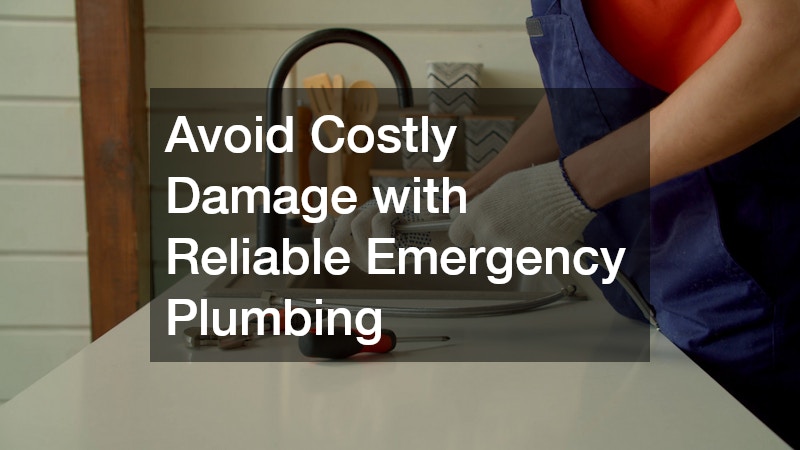In today’s world, plumbing issues can arise at any time, often resulting in inconvenient and costly scenarios. Emergency plumbing refers to urgent plumbing situations that require immediate attention, such as burst pipes, sewer backups, and overflowing toilets. When these situations occur, having access to reliable emergency plumbing services can save homeowners and businesses from significant damage and expenses. This article will explore the critical signs of a plumbing emergency, how to find trustworthy plumbing services, steps to take while waiting for assistance, and preventive measures to avoid such emergencies in the first place.
What are some common signs of a plumbing emergency?
Recognizing the signs of a plumbing emergency can be crucial in preventing further damage to your property. Homeowners should watch for leaking water, especially around fixtures, as well as signs of excessive dampness on walls or ceilings. Strange noises like gurgling or banging from pipes can indicate underlying issues that may escalate without quick attention.
Changes in water pressure can also signal a plumbing emergency. A sudden drop or increase in pressure can point to pipe blockages or leaks. Additionally, if you find that your water bill has unexpectedly surged, it may be a sign of a hidden leak that needs immediate investigation. Ignoring these signs may lead to costly repairs later on.
A strong sewage odor in your home can indicate a serious plumbing problem, such as a clogged sewer line. Backed-up drains or toilets can also cause significant inconvenience and mess, requiring prompt professional intervention. Being vigilant about these signs can help homeowners act quickly before a minor issue turns into a major disaster.
How can I find a reliable emergency plumbing service?
Finding a dependable emergency plumbing service can feel overwhelming, especially in a time of crisis. Start by asking friends, family, and neighbors for recommendations based on their experiences with local plumbers. Word-of-mouth referrals can provide insights into the quality and reliability of service providers in your area.
Online reviews and ratings can also be valuable tools for assessing potential plumbing services. Websites like Yelp or Angie’s List aggregate reviews from customers who have utilized these services. Look for professionals with a high number of positive reviews and testimonials that speak to their expertise and response time, especially in emergencies.
Ensure that any plumbing service you consider is properly licensed and insured. Certifications indicate that the plumber has met certain standards of training and expertise. Additionally, having insurance protects you as a homeowner in case of accidents during the service, adding an extra layer of security when seeking help during an emergency.
What should I do in a plumbing emergency before help arrives?
In the event of a plumbing emergency, taking immediate action can mitigate damage and make it easier for professionals to resolve the issue. One of the first steps homeowners should take is to locate and shut off the main water supply to prevent further water flow. Familiarizing yourself with your home’s water shut-off location can save you valuable time during a crisis.
If the emergency involves a leak or overflowing toilet, use towels or buckets to contain the water and prevent further flooding. Removing any valuable items from the vicinity can also help protect them from water damage. While waiting for the plumber to arrive, try to assess the situation and prepare relevant details, such as when the issue started and any unusual signs you’ve noticed.
It is important to avoid attempting to repair complex plumbing issues yourself, as doing so could worsen the situation. Instead, focus on keeping the area safe and documenting the problem. When the plumber arrives, providing them with thorough information can expedite the diagnostic and repair process, leading to a quicker resolution of the emergency.
How can I prevent plumbing emergencies in the first place?
Prevention is key when it comes to avoiding plumbing emergencies. Regular maintenance checks of your plumbing system can help identify potential issues before they escalate. Consider scheduling annual inspections with a qualified plumber who can examine your pipes, fixtures, and water pressure, ensuring everything is in safe working order.
Simple practices can also go a long way in preventing plumbing problems. For instance, being mindful of what goes down your drains can help avoid clogs. Avoid flushing anything other than toilet paper and consistently using drain strainers in sinks can prevent debris from creating blockages.
Additionally, during colder months, take steps to insulate pipes to prevent freezing and potential bursts. Knowing the signs of plumbing wear and tear allows homeowners to address minor issues proactively. Regular maintenance and awareness of your plumbing system will significantly reduce the chances of a plumbing emergency occurring in the first place.
In summary, having a clear understanding of plumbing emergencies and knowing how to respond is crucial for homeowners. Recognizing the signs of an emergency, finding a reliable plumbing service, and knowing what to do while waiting for help can greatly minimize damage. Additionally, by prioritizing regular plumbing maintenance and taking preventive measures, you can reduce the likelihood of experiencing a costly plumbing emergency. Having a trusted emergency plumber on speed dial can provide peace of mind and safeguard your property against unexpected plumbing crises.



